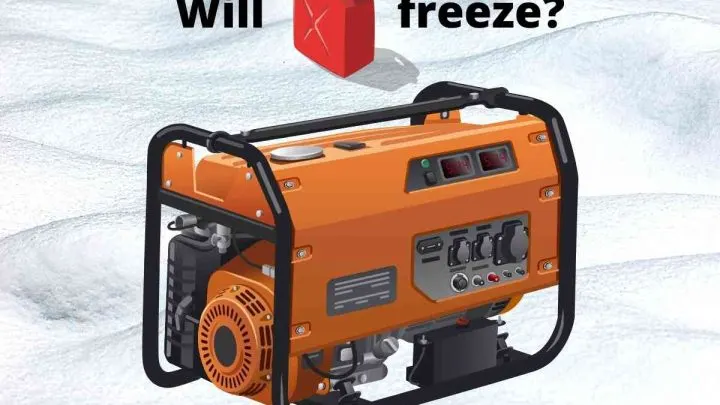Having a generator on hand is a good idea, so you have a source of electricity in case there is a power blackout. Alternatively, you may need a power supply in an area that doesn’t have an electrical network. However, if you live in an extremely cold area, you may be concerned that the gas could freeze in the generator.
It is highly unlikely that gas will freeze in a generator. The freezing point of gas varies from -45 to -200 degrees Fahrenheit (-42.78 to -128.9 degrees Celsius), so it is unlikely that the temperature will reach a point where the gas freezes.
In the rest of this article, I’ll explain why you don’t need to worry about gas freezing in your generator. You will also learn how to protect your generator in cold conditions, and the benefits of having a generator.
Will Gas Freeze in a Generator?
Gas will not freeze in a generator unless it is in extreme cold temperatures. The freezing point of gasoline is extremely low, and it is unlikely that you will experience the kind of cold necessary to freeze gasoline.
Gasoline, unlike other liquids, does not have a specific freezing point because of the elements and additives added to it. Each of these additives has a different freezing point, so when they are all mixed in different proportions, they change the freezing point of the liquid.
In general, gas can freeze anywhere from -45 to -200 degrees Fahrenheit (-42.78 to -128.9 degrees Celsius). The most common freezing point lies somewhere around -100 degrees Fahrenheit (-73.33 degrees Celsius) (source).
If you live in an extremely cold place, it is possible that the gas inside your generator could freeze. The likelihood of this happening depends on the makeup of your gasoline. Still, in general, it is highly unlikely that the temperatures in your locality will get so low that the gasoline in your generator freezes.
However, this doesn’t mean that cold temperatures won’t impact your generator. When the engine and other components get too cold, certain things can go wrong. If you live in an extremely cold area, such as Alaska or parts of the Midwest, you must ensure your generator can work in sub-zero temperatures. Hence, if power goes out, you will be safe and warm; thanks to your backup generator.
How to Keep Your Generator Working in Cold Conditions
One of the most important things you can do to ensure your generator works, even in super cold conditions, is to regularly check the battery. For your peace of mind, the battery should be in perfect condition before the start of winter, as a battery that is not fully charged is likely to fail in cold conditions (source).
Batteries also lose power in severe cold. So if you get a new one, you want to get one with higher cold-cranking amps that will help it last through the cold.
Check the Oil
You should also check the generator oil and make sure there is enough. Some generators automatically shut down when there isn’t enough oil for the engine to operate properly. Therefore, it is important that you don’t forget to check your oil level regularly. Additionally, it’s a good idea to keep some oil on hand in case of an emergency.
Exercise the Generator
Another way to protect your generator and keep it functioning as it should for a long time is to exercise it regularly. Generators can break down due to lack of use, so at least once a week, you should let it run for ten minutes to keep all the moving parts lubricated and working.
Check Your Manual
It’s always advisable to also consult the owner’s manual and adhere to the maintenance schedule suggested by the manufacturer. As a general rule, you should check the carburetor, filters, and spark plugs often.
Gasoline freezing in your generator shouldn’t be one of your main concerns during the winter months because this is highly unlikely to happen. Instead of fretting about that possibility, you can put your energy into checking and maintaining your generator regularly so it will work when you need it most.
Benefits of Having a Generator
Purchasing and maintaining a generator can be a bit of a hassle, but it is well worth the effort. Having a generator on hand has many benefits, especially if you live in a cold place. Here are some great reasons to have a generator (and go through the trouble of maintaining it):
- You can have peace of mind that you’ll have a power source if you experience a blackout. This is especially important in places that experience extreme cold. It would be horrible and dangerous to go through a power blackout and have no way to power any heaters in the middle of winter. Having a generator gives you the comfort of knowing that you have a backup if something happens to your power.
- You can save refrigerated and frozen items in the event of a blackout. You can quickly lose hundreds of dollars worth of food if your area goes through a blackout for more than a few hours. Any perishable foods that go unrefrigerated for more than four hours need to be thrown away. This can be an expensive loss if you have a full freezer and refrigerator (source).
- You live in a house that uses well water. Municipal water systems will work during a power outage. However, if you live in a house that relies on electric pumps to pump water out of wells, you’ll be out of luck during a power blackout – unless you have a generator.
- You spend a lot of time in remote areas. If you go camping a lot, you can bring a generator to charge devices and refrigerate food items. You can also use a generator to power tools while working in a remote area.
- If you work at home, you can keep working even if the power goes out. More Americans work at home now than ever, so a power blackout would mean that they would have a complete work shutdown. A generator can keep computers and the internet running, so people don’t have to stop working.
If you live in an area that goes through frequent blackouts, a generator is a necessary tool to have on hand.
Conclusion
There are many benefits to having a generator. And because gas has such a low freezing point, you don’t need to worry about the gas freezing in the machine. If you are concerned about your generator in cold conditions, there are some things you can do to winterize your generator to protect it from damage. Be sure to follow the helpful suggestions provided in this article.
Recommended Reading

